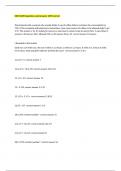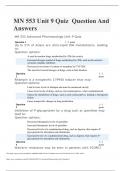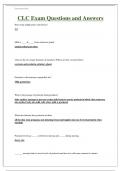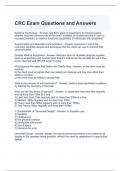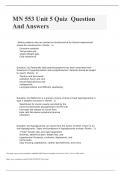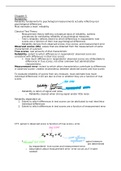Know the Difference
Validity- the degree to which a measure captures what it is intended to measure
Reliability- the consistency of measurement
Ch. 1 & Ch. 4 Textbook
What is OB?
Organizational behavior: all about understanding factors at the individual, group, and or
organizational level that help or hinder individual and organizational interactions and
effectiveness
Three levels of analysis in OB: the individual, the group (society), the organization
Ex - To understand boss’ personality, we use individual level of analysis.
- If we want to know abt how our manager’s personality affects team, we are examining
things at team or group level
- If we want to understand how our organization’s culture affects organizational
performance, we would be interested in organizational level of analysis
-
What work attitudes do we consider when attempting to determine organizational
outcomes?
Attitudes: our opinions, beliefs, and feelings about aspects of our environment
- Job satisfaction- the feelings people have toward their job
- Organizational commitment- the emotional attachment people have toward the
company they work for
- Job engagement- the investment of one’s mental, emotional, and physical energies into
work (reflects employees’ enthusiasm, involvement, and satisfaction with their work)
What factors contribute to positive job attitudes?:
Several aspects of their work environment: personality, person-environment fit, job
characteristics, psychological contract, organizational justice, work relationships, stress, and
work-life balance
Personality- Job satisfaction is not purely environmental, partially due to personality.
-Some people who have positive affective disposition (those who have tendency to
experience positive moods more often than negative moods) tend to be more satisfied w/
their jobs/more committed to their companies
Negative disposition- less satisfied and less committed
-People who have positive core self-evaluations (those w/ high generalized self-efficacy, high
self-esteem, internal locus of control, and low levels of neuroticism) tend to have more positive
job attitudes
Self-efficacy-
Internal locus of control-
Neuroticism-
,Person-environment fit- person job fit & person organization fit positively related to job
satisfaction & commitment
Person-organization fit: the degree to which a person’s personality, values, goals, and other
characteristics match those of the organization
Person-job fit: the degree to which a person’s knowledge, skills, abilities, and other
characteristics match the job demands
*When abilities of individuals match those of the job demands and company values, they tend to
be more satisfied w/ job and more committed to company
Job characteristics- presence of certain characteristics on the job seems to make employees
more satisfied & committed (ex. Using variety of complex skills, having empowerment at work,
receiving feedback on job, performing significant task)
Psychological contract- an unwritten understanding about what employee will bring to work
environment & what company will provide in exchange
- When there’s psychological contract breach, which is when people don’t get what
they expect/are told, there is low job satisfaction and commitment
Organizational justice- how fairly we are treated indicates our satisfaction level. People pay
attention to fairness of company policies & procedures, treatment from supervisors, pay/other
rewards they receive from company
Work relationships- people we interact w/, their degree of compassion, our level of social
acceptance in work group, whether we are treated w/ respect- all important factors surrounding
happiness at work
-relationship w/ manager, how considerate manager is, whether we build trust-based
relationship w/ manager→ important for job attitudes
*Perceived organizational support- degree to which employees feel that organization cares
about their well being, values them, fulfills their needs is an important influence over job
attitudes
Stress- role ambiguity, role conflict, organizational politics, worrying abt security of job→
DISSATISFACTION
- Not all stress is bad, though. Some make us happier (ex. Working under time pressure,
having high degree of responsibility)
Work-life balance- when work interferes w/ family life→ stressed & unhappy w/ jobs
What are the consequences of positive job attitudes?
- Work attitudes are often good predictors of work behavior, such as performance,
- citizenship behaviors (behaviors not part of job but valuable to the workplace- ex.
Helping new employees/voluntary overtime)
- Absenteeism (unscheduled absences from work) (less, meaning absent less
frequently)
- Turnover (rate employees leave the company. Lower turnover (stay at company longer)
if employee is satisfied and committed
, What factors have the strongest influence over key work behaviors (job performance,
citizenship, counterproductive work behaviors, absenteeism, turnover)?
- Job satisfaction, organizational citizenship behaviors, counterproductive work behaviors
(intentional employee behaviors that harm that organization), absenteeism, turnover
- Absenteeism: reasons are health reasons, work life balance, and poor work
attitudes
Validity- the degree to which a measure captures what it is intended to measure
Reliability- the consistency of measurement
Ch. 1 & Ch. 4 Textbook
What is OB?
Organizational behavior: all about understanding factors at the individual, group, and or
organizational level that help or hinder individual and organizational interactions and
effectiveness
Three levels of analysis in OB: the individual, the group (society), the organization
Ex - To understand boss’ personality, we use individual level of analysis.
- If we want to know abt how our manager’s personality affects team, we are examining
things at team or group level
- If we want to understand how our organization’s culture affects organizational
performance, we would be interested in organizational level of analysis
-
What work attitudes do we consider when attempting to determine organizational
outcomes?
Attitudes: our opinions, beliefs, and feelings about aspects of our environment
- Job satisfaction- the feelings people have toward their job
- Organizational commitment- the emotional attachment people have toward the
company they work for
- Job engagement- the investment of one’s mental, emotional, and physical energies into
work (reflects employees’ enthusiasm, involvement, and satisfaction with their work)
What factors contribute to positive job attitudes?:
Several aspects of their work environment: personality, person-environment fit, job
characteristics, psychological contract, organizational justice, work relationships, stress, and
work-life balance
Personality- Job satisfaction is not purely environmental, partially due to personality.
-Some people who have positive affective disposition (those who have tendency to
experience positive moods more often than negative moods) tend to be more satisfied w/
their jobs/more committed to their companies
Negative disposition- less satisfied and less committed
-People who have positive core self-evaluations (those w/ high generalized self-efficacy, high
self-esteem, internal locus of control, and low levels of neuroticism) tend to have more positive
job attitudes
Self-efficacy-
Internal locus of control-
Neuroticism-
,Person-environment fit- person job fit & person organization fit positively related to job
satisfaction & commitment
Person-organization fit: the degree to which a person’s personality, values, goals, and other
characteristics match those of the organization
Person-job fit: the degree to which a person’s knowledge, skills, abilities, and other
characteristics match the job demands
*When abilities of individuals match those of the job demands and company values, they tend to
be more satisfied w/ job and more committed to company
Job characteristics- presence of certain characteristics on the job seems to make employees
more satisfied & committed (ex. Using variety of complex skills, having empowerment at work,
receiving feedback on job, performing significant task)
Psychological contract- an unwritten understanding about what employee will bring to work
environment & what company will provide in exchange
- When there’s psychological contract breach, which is when people don’t get what
they expect/are told, there is low job satisfaction and commitment
Organizational justice- how fairly we are treated indicates our satisfaction level. People pay
attention to fairness of company policies & procedures, treatment from supervisors, pay/other
rewards they receive from company
Work relationships- people we interact w/, their degree of compassion, our level of social
acceptance in work group, whether we are treated w/ respect- all important factors surrounding
happiness at work
-relationship w/ manager, how considerate manager is, whether we build trust-based
relationship w/ manager→ important for job attitudes
*Perceived organizational support- degree to which employees feel that organization cares
about their well being, values them, fulfills their needs is an important influence over job
attitudes
Stress- role ambiguity, role conflict, organizational politics, worrying abt security of job→
DISSATISFACTION
- Not all stress is bad, though. Some make us happier (ex. Working under time pressure,
having high degree of responsibility)
Work-life balance- when work interferes w/ family life→ stressed & unhappy w/ jobs
What are the consequences of positive job attitudes?
- Work attitudes are often good predictors of work behavior, such as performance,
- citizenship behaviors (behaviors not part of job but valuable to the workplace- ex.
Helping new employees/voluntary overtime)
- Absenteeism (unscheduled absences from work) (less, meaning absent less
frequently)
- Turnover (rate employees leave the company. Lower turnover (stay at company longer)
if employee is satisfied and committed
, What factors have the strongest influence over key work behaviors (job performance,
citizenship, counterproductive work behaviors, absenteeism, turnover)?
- Job satisfaction, organizational citizenship behaviors, counterproductive work behaviors
(intentional employee behaviors that harm that organization), absenteeism, turnover
- Absenteeism: reasons are health reasons, work life balance, and poor work
attitudes

